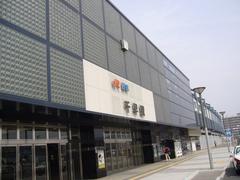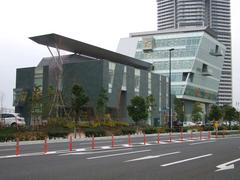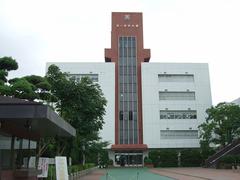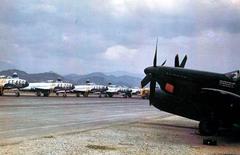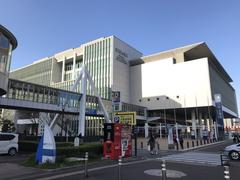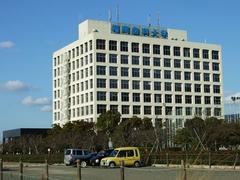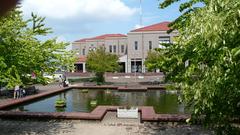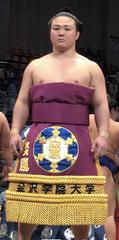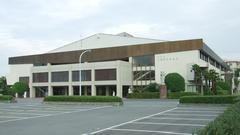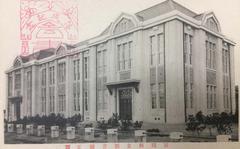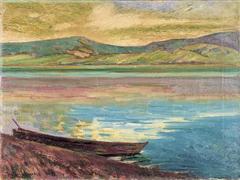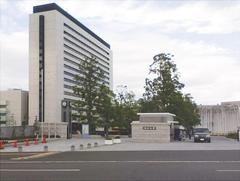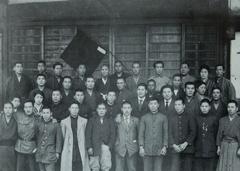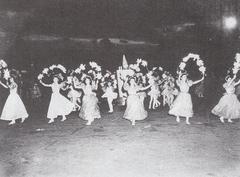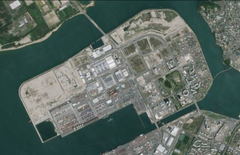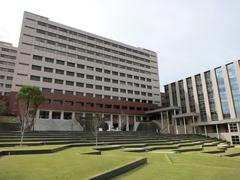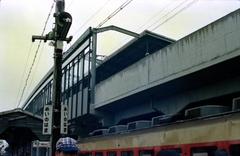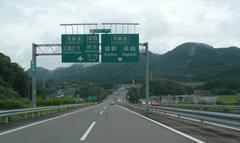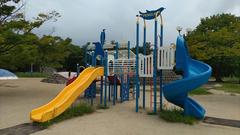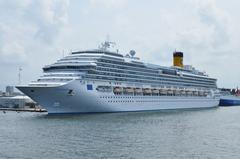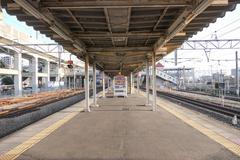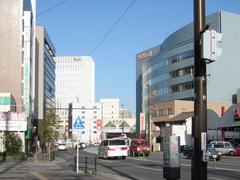
Japanese Red Cross Fukuoka Hospital: Visiting Hours, Tickets, and Visitor Information
Date: 04/07/2025
Introduction
Nestled in the dynamic city of Fukuoka, the Japanese Red Cross Fukuoka Hospital stands as a symbol of advanced medical care and humanitarian service. As part of the Japanese Red Cross Society’s storied network, this hospital not only serves the Kyushu region with specialized treatments in nephrology, cardiovascular surgery, and mental health, but also embodies the Red Cross principles of impartiality and voluntary service. Beyond its medical significance, the hospital occupies a prominent place in local history due to its longstanding commitment to disaster response and community health. Whether you are a patient, visitor, or a history enthusiast, this guide offers an in-depth overview of the hospital’s operations, visitor protocols, and nearby attractions, ensuring you can plan your visit with confidence and insight (Japanese Red Cross Society, gofukuoka.jp).
Table of Contents
- Introduction
- History and Development
- Role in Regional Healthcare and Disaster Response
- Medical Specializations and Innovations
- Visiting Hours and Visitor Information
- Accessibility for International Patients
- Nearby Fukuoka Historical Sites
- FAQ
- Japanese Red Cross Fukuoka Hospital Monument
- Fukuoka Castle Ruins Visitor Guide
- Conclusion
- References
History and Development
The Japanese Red Cross Fukuoka Hospital (福岡赤十字病院, Fukuoka Sekijūji Byōin) was established as part of the nationwide Red Cross network, following the foundation of the Japanese Red Cross Society in 1877. Located in Minami Ward, Fukuoka City, this hospital has grown alongside the city itself—renowned for over 2,000 years of international exchange and cultural evolution. Throughout its history, the hospital has played a vital role not only in local healthcare, but also in disaster response and humanitarian relief (Wikipedia, gofukuoka.jp).
Role in Regional Healthcare and Disaster Response
The hospital is an essential hub for emergency and disaster response in Kyushu, frequently mobilizing for earthquakes, typhoons, and other crises. Its ICU and acute care facilities, alongside coordinated disaster preparedness programs, are central to the region’s resilience. The hospital also leads public health initiatives, including vaccination drives and blood donations, while maintaining an active presence in community health education (Wikipedia).
Medical Specializations and Innovations
The hospital is renowned for its advanced expertise in:
- Nephrology and Kidney Transplantation: Recognized for specialized renal care and authorized kidney transplants.
- Cardiovascular Surgery: State-of-the-art facilities for heart and vascular interventions.
- Rehabilitation and Disability Care: Comprehensive support for disabilities affecting multiple body systems.
- Mental Health: Outpatient psychiatric services for a range of mental health needs.
Continuous technological adoption and collaboration with other Red Cross institutions enable the hospital to offer innovative and patient-centered care (Wikipedia).
Visiting Hours and Visitor Information
- Visiting Hours: Generally from 1:00 PM to 8:00 PM daily. Specific times may vary by ward or patient condition—confirm in advance before visiting.
- Admission/Tickets: As a functioning hospital, entry is limited to patients, staff, and authorized visitors. No public tours or ticketed access are available.
- Directions: Accessible via Fukuoka City Subway Nanakuma Line and local bus routes. The hospital is a short taxi or bus ride from central Fukuoka.
- Facilities: The hospital is equipped with accessibility features for visitors with disabilities, and some multilingual support is available. The primary language is Japanese.
Accessibility for International Patients
The hospital supports international patients as part of a growing regional initiative. Non-Japanese speakers are encouraged to bring English medical records and emergency contact details. Payment by international credit cards is accepted, but carrying travel health insurance is highly recommended (Live Japan).
Nearby Fukuoka Historical Sites
Enhance your visit by exploring Fukuoka’s renowned historical and cultural attractions nearby:
- Hakata Old Town: Traditional temples and local crafts.
- Fukuoka Castle Ruins: Remnants of a grand Edo-period castle in Maizuru Park.
- Kushida Shrine: A central site for the famous Hakata Gion Yamakasa festival (gofukuoka.jp).
FAQ
Q: What are the hospital’s visiting hours?
A: Generally 1:00 PM to 8:00 PM, but check with the hospital for ward-specific times.
Q: Are tourists allowed to tour the hospital?
A: No, as it is an active medical facility, there are no public tours.
Q: Is support available for non-Japanese speakers?
A: Some multilingual assistance is available. Bringing English-language medical documents is recommended.
Q: How do I get to the hospital?
A: The hospital is accessible by subway and bus; taxis are also convenient from downtown Fukuoka.
Q: Are admission tickets required?
A: No tickets are needed; entry is restricted to patients and authorized visitors.
Japanese Red Cross Fukuoka Hospital Monument: Visitor Guide
Overview
Beyond its vital healthcare role, the hospital is also home to a monument and exhibits that chronicle the history of the Japanese Red Cross in Fukuoka. These displays highlight the institution’s humanitarian contributions, especially in times of disaster and conflict (Japanese Red Cross Society).
Visiting Information
- Monument Hours: Monday–Friday, 9:00 AM–5:00 PM (closed on weekends and holidays).
- Admission: Free.
- Guided Tours: Available by appointment; English-language guides can be arranged in advance.
- Address: 3-1-1, Ogusu, Minami-Ku, Fukuoka.
- Access: Reachable by public transport; limited parking on-site.
Visitor Tips
- Photography is allowed in designated areas.
- Please maintain quiet, respectful behavior.
- Most signage is in Japanese; guided tours or translation apps are helpful.
Nearby Cultural Sites
Consider visiting Fukuoka Castle Ruins, Ohori Park, and the Hakata Traditional Craft and Design Museum to round out your historical exploration of the city.
Fukuoka Castle Ruins: Visitor Information
History and Significance
Fukuoka Castle, or Maizuru Castle, was constructed between 1601 and 1607 by Kuroda Nagamasa. Although most of the original structure was dismantled during the Meiji Restoration, the remaining stone walls and moats in Maizuru Park offer a glimpse into Japan’s feudal past (Fukuoka City Tourism Official Website).
Location and Access
- Address: Maizuru Park, Chuo-ku, Fukuoka City.
- Nearest Subway: Akasaka Station (Kuko Line), approx. 10-minute walk.
- Buses: Multiple routes serve the park area.
Hours and Admission
- Open: Daily, 7:00 AM–7:00 PM (may vary seasonally).
- Admission: Free; guided tours may incur a fee.
Facilities
- Wheelchair-accessible paths and restrooms are available.
- Parking is limited; public transport is recommended.
Highlights
- Explore preserved stone walls, scenic parkland, and panoramic viewpoints.
- Visit the Fukuoka Castle Museum for exhibits on samurai culture and archaeology.
- Enjoy cherry blossoms in spring and seasonal festivals throughout the year.
Frequently Asked Questions (Fukuoka Castle Ruins)
Q: Is there an entrance fee?
A: No, entry to the ruins and Maizuru Park is free.
Q: Are guided tours available?
A: Yes, tours in English and Japanese are offered; advance booking recommended.
Q: Is the site accessible?
A: Most paths are wheelchair-friendly, though some areas have uneven ground.
Q: Can I take photos?
A: Yes, photography is allowed throughout the site.
Conclusion
The Japanese Red Cross Fukuoka Hospital is not just a hub of modern medical care—it is a testament to the enduring spirit of humanitarian service in Fukuoka. From its historical roots to its role in contemporary disaster response, the hospital offers both functional excellence and cultural significance. While visitors must respect its status as an active healthcare facility, those interested in its history can explore the monument and nearby attractions such as Fukuoka Castle Ruins and Ohori Park. With careful planning and respect for hospital protocols, your visit can be both meaningful and enriching.
For updated information, visitor guidelines, and travel resources, consult the official websites and consider downloading the Audiala app for personalized guidance.
References
- Japanese Red Cross Society History
- Japanese Red Cross Fukuoka Hospital: Visiting Hours, Services & Historical Significance in Fukuoka
- Fukuoka Castle Ruins: History, Visiting Hours, Tickets, and Travel Guide
- Wikipedia - 福岡赤十字病院
- Live Japan - Hospital Guide

